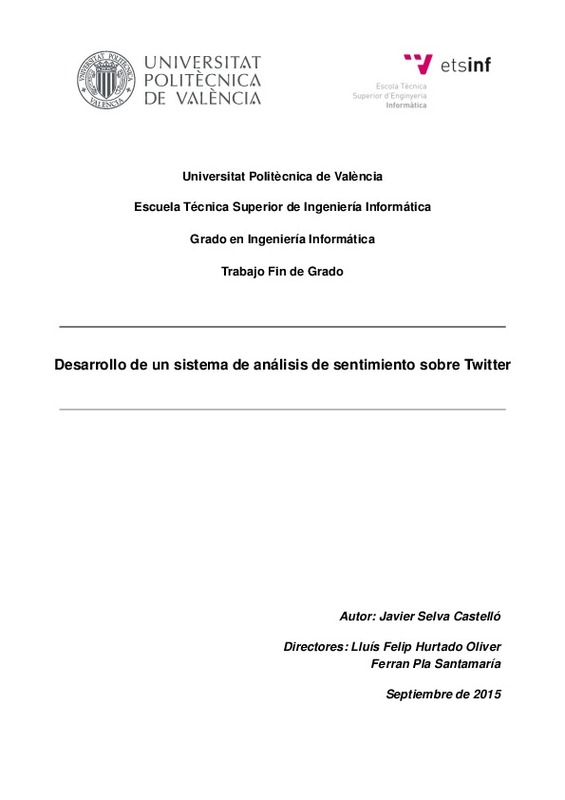|
[ES] Twitter se ha convertido en una de las plataformas on-line más utilizadas para expresar opiniones
e ideas. Es debido a esta razón que resulta una fuente ideal de información de la que
extraer estadísticas sociales. ...[+]
[ES] Twitter se ha convertido en una de las plataformas on-line más utilizadas para expresar opiniones
e ideas. Es debido a esta razón que resulta una fuente ideal de información de la que
extraer estadísticas sociales. Este proyecto pretende analizar esta información centrándose en el
estudio de la polaridad. El análisis de sentimientos sobre Twitter busca establecer la subjetividad
de las opiniones expresadas sobre esta plataforma.
El objetivo del proyecto es el desarrollo de una aplicación web basada en Django. Esta debe
agrupar diversas herramientas de clasificación que generen estadísticas de polaridad a partir de
un conjunto de tuits. Además, la aplicación almacenará un histórico con el que mostrar la evolución
de los resultados.
Por otra parte, se ha desarrollado un sistema de resumen automático basado en la extracción
de los tuits más representativos para una búsqueda concreta. Para ello se ha implementado un
sistema basado en el Análisis Semántico Latente el cual también tiene en cuenta la popularidad
de un tuit a la hora de escogerlo para el resumen. Con el objetivo de probar este sistema se
ha realizado un proceso de experimentación que abarca desde la elaboración de un corpus de
tuits puntuados manualmente por relevancia, hasta el estudio de las diferentes características de
Twitter que hacen que un tuit se considere popular.
[-]
[EN] Twitter has become one of the most popular online platforms used to express opinions and
ideas. For this reason, Twitter is a great source of information which can be used to produce
social statistics. This project ...[+]
[EN] Twitter has become one of the most popular online platforms used to express opinions and
ideas. For this reason, Twitter is a great source of information which can be used to produce
social statistics. This project is focused on one specific aspect of the analysis of this information:
polarity. The goal of Sentiment analysis on Twitter is finding the subjectivity within the opinions
expressed in this platform.
The aim of the project is developing a Django based web application. It should gather different
classification tools in order to obtain polarity statistics out of a tweet set. Also, the application
will store the outcome in order to show evolution of the results.
Moreover, an automatic summarization tool has been also developed. It’s based on the extraction
of the most relevant tweets for a specific query. In order to do so it has been implemented
a system based on Latent Semantic Analysis. This system also considers the tweets’ popularity
when producing the summary. The system was tested by manually scoring a tweet corpus by
relevance and studying the different Twitter features that makes a tweet popular.
[-]
|







